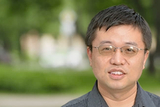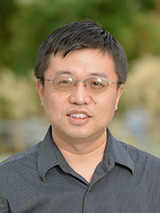

As computational biologist Yi Xing, PhD, launches the Center for Computational and Genomic Medicine at Children’s Hospital of Philadelphia (CHOP), he draws on his “bilingual” strengths. In this case, bilingual refers to his fluency in two scientific disciplines: computational biology and experimental biology.
Likewise, the new center will have a hybrid character in which computational biology research will pave the way for new projects in wet laboratories. In particular, Xing aims to leverage recent advancements in sequencing technology and computational biology to drive new discoveries in diagnosing and treating pediatric diseases. This summer, he brought his 20-member laboratory team from the University of California Los Angeles to the new center at CHOP, which officially opened on Sept. 1.
The center will recruit new faculty members, focusing on experts who are not only adept at using existing technology, but who can also develop new genomic technologies or computational tools that can be offered to a broader community of scientists. “Our goal is to make the center an engine for technological and biomedical innovation,” Xing adds.
As the center takes its place within CHOP’s entire ecosystem of research, in which basic science, clinical and translational programs exchange information and insights, Xing says, “we will use data and technology to make a difference in people’s lives.”
Xing’s own laboratory will continue to investigate cancer immunotherapy, already a major research and clinical area at CHOP, which has pioneered the use of CAR T-cell therapy in treating children with relapsed and refractory acute lymphoblastic leukemia. He also expects to develop a focus on genetic diseases, another research strength at CHOP. His long-term research goal is investigating how variation in RNA processing and regulation affects human health and disease.
RNA processing and regulation, he adds, are crucial in producing complexity, as each of our roughly 20,000 human genes may generate over 10 or more gene products such as messenger RNAs and proteins. That complexity arises because when genetic information in the DNA is copied into messenger RNA (mRNA), there are different ways to piece together that information, through alternative processing and modifications of RNA. These RNA-level regulatory processes can change how gene products are made and cause disease, modify disease risk, or make a disease milder or more severe.
Because so many human mutations disrupt RNA and contribute to disease, Xing’s work in mastering how to manage and interpret big data offers opportunities for improved diagnoses and treatments.
In applying their capabilities to cancer immunotherapy, for instance, Xing’s team expects to use transcriptomics, proteomics and other “omic” types of big data analysis to identify novel proteins that reside in cancer cells but not normal cells. If those proteins can be recognized and attacked by the immune system, they could become targets for new precision medicine cancer treatments.
Xing’s work in cancer immunotherapy is supported by various National Institutes of Health research programs, including the Big Data to Knowledge (BD2K) initiative and the Cancer Moonshot Immuno-Oncology Translation Network (IOTN), and he anticipates expanding this research into pediatric cancers at CHOP.
Xing plans broad collaborations with existing centers and programs at CHOP — the Center for Cellular and Molecular Therapeutics and the Department of Biomedical and Health Informatics, among others. Working in a large pediatric hospital, he says he will apply his expertise in investigating the underexplored roles of RNA defects to help drive new discoveries in children’s health.
“Dr. Xing is one of the world’s outstanding investigators in this crucial area — harnessing innovative computational approaches to discover new avenues to advance human health,” said Beverly L. Davidson, PhD, CHOP’s Chief Scientific Strategy Officer. “We are excited that he and his team will enhance one of our core missions — using collaborative data to benefit children and families worldwide.”
For more about the new center, see this article on the CHOP Research Institute blog.

As computational biologist Yi Xing, PhD, launches the Center for Computational and Genomic Medicine at Children’s Hospital of Philadelphia (CHOP), he draws on his “bilingual” strengths. In this case, bilingual refers to his fluency in two scientific disciplines: computational biology and experimental biology.
Likewise, the new center will have a hybrid character in which computational biology research will pave the way for new projects in wet laboratories. In particular, Xing aims to leverage recent advancements in sequencing technology and computational biology to drive new discoveries in diagnosing and treating pediatric diseases. This summer, he brought his 20-member laboratory team from the University of California Los Angeles to the new center at CHOP, which officially opened on Sept. 1.
The center will recruit new faculty members, focusing on experts who are not only adept at using existing technology, but who can also develop new genomic technologies or computational tools that can be offered to a broader community of scientists. “Our goal is to make the center an engine for technological and biomedical innovation,” Xing adds.
As the center takes its place within CHOP’s entire ecosystem of research, in which basic science, clinical and translational programs exchange information and insights, Xing says, “we will use data and technology to make a difference in people’s lives.”
Xing’s own laboratory will continue to investigate cancer immunotherapy, already a major research and clinical area at CHOP, which has pioneered the use of CAR T-cell therapy in treating children with relapsed and refractory acute lymphoblastic leukemia. He also expects to develop a focus on genetic diseases, another research strength at CHOP. His long-term research goal is investigating how variation in RNA processing and regulation affects human health and disease.
RNA processing and regulation, he adds, are crucial in producing complexity, as each of our roughly 20,000 human genes may generate over 10 or more gene products such as messenger RNAs and proteins. That complexity arises because when genetic information in the DNA is copied into messenger RNA (mRNA), there are different ways to piece together that information, through alternative processing and modifications of RNA. These RNA-level regulatory processes can change how gene products are made and cause disease, modify disease risk, or make a disease milder or more severe.
Because so many human mutations disrupt RNA and contribute to disease, Xing’s work in mastering how to manage and interpret big data offers opportunities for improved diagnoses and treatments.
In applying their capabilities to cancer immunotherapy, for instance, Xing’s team expects to use transcriptomics, proteomics and other “omic” types of big data analysis to identify novel proteins that reside in cancer cells but not normal cells. If those proteins can be recognized and attacked by the immune system, they could become targets for new precision medicine cancer treatments.
Xing’s work in cancer immunotherapy is supported by various National Institutes of Health research programs, including the Big Data to Knowledge (BD2K) initiative and the Cancer Moonshot Immuno-Oncology Translation Network (IOTN), and he anticipates expanding this research into pediatric cancers at CHOP.
Xing plans broad collaborations with existing centers and programs at CHOP — the Center for Cellular and Molecular Therapeutics and the Department of Biomedical and Health Informatics, among others. Working in a large pediatric hospital, he says he will apply his expertise in investigating the underexplored roles of RNA defects to help drive new discoveries in children’s health.
“Dr. Xing is one of the world’s outstanding investigators in this crucial area — harnessing innovative computational approaches to discover new avenues to advance human health,” said Beverly L. Davidson, PhD, CHOP’s Chief Scientific Strategy Officer. “We are excited that he and his team will enhance one of our core missions — using collaborative data to benefit children and families worldwide.”
For more about the new center, see this article on the CHOP Research Institute blog.